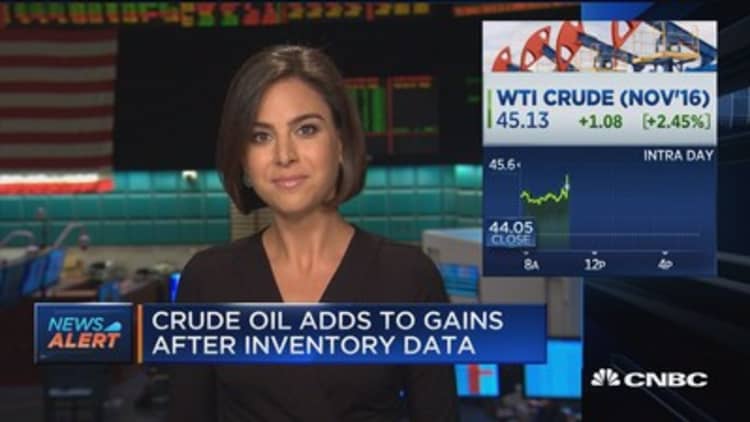Oil prices were up as much as 3 percent on Wednesday after a surprise drop in crude stockpiles reported by the U.S. government, marking a third weekly decline in the closely watched data.
Prices were slightly higher after the Federal Reserve said it would leave interest rates unchanged. The dollar fell after the announcement, making dollar-denominated commodities, such as crude oil, more affordable to holders of other currencies.
Brent crude futures were up 99 cents, or 2.16 percent at $46.87 per barrel by 2:40 p.m. ET, while U.S. West Texas Intermediate (WTI) crude futures climbed $1.28, or 2.91 percent, to $45.33 a barrel.
The U.S. Energy Information Administration (EIA) said domestic crude inventories fell by 6.2 million barrels for the week ended Sept. 16, versus a 3.4 million-barrel drop forecast by oil market analysts polled by Reuters.
Crude stocks in the world's largest oil consumer have fallen since this month began. Some 14.5 million barrels were reported drawn for the week ended Sept. 2, the biggest weekly drop in 15 years after a tropical storm that slowed the arrival of oil imports in the U.S. Gulf Coast. In the subsequent week to Sept. 9, there was another decline of 559,000 barrels.

While the draws have put a bullish face of sorts on oil, they also contrast with surging production from OPEC and other major producers such as Russia, causing a swing in crude prices lately.
"We are still very well supplied for this time of year," said Tariq Zahir, trader in crude oil spreads at Tyche Capital Advisors in New York.
Some market participants were puzzled by the U.S. crude draw when imports as a whole rose and refinery runs fell.
U.S. crude imports rose last week by 77,000 barrels per day, but the rate dropped sharply in the U.S. Gulf, falling about 500,000 bpd to 2.9 million bpd, close to the record low of 2.5 million bpd hit in the week to Sept. 2 when the storm disrupted supplies.
Refinery crude runs fell 143,000 bpd as utilization rates fell 0.9 percentage point but were still high at 92 percent of total capacity.
U.S. gasoline futures rose 2 percent after data showed stocks of the motor fuel fell 3.2 million barrels nationwide, compared with analysts' expectations for a 567,000-barrel drop.
That contrasted with record builds in the Gulf Coast and record draws in the East Coast, amid a near two-week outage on a key gasoline line that runs from the refining hub in the south to northeast. The line was to reopen on Wednesday.
"The Colonial pipeline mess is evident in the gasoline data, which showed supplies stranded in the Gulf and drawn down in the East. We will have to see if the trends normalize next week," said John Kilduff, partner at New York energy hedge fund Again Capital in New York.

Adding to the upward price momentum was an oil service workers strike in Norway that could impact output from western Europe's biggest crude producing region.
Key for the market is next week's meeting in Algeria between producers from the Organization of the Petroleum Exporting Countries (OPEC) and Russia to discuss measures to rein in oversupply, including an output freeze at current levels, but analysts said they did not expect significant results.
"Even with a freeze — which would still mean OPEC production is at record levels — we will still be in an oversupplied market," said Matt Stanley, a fuel broker at Freight Investor Services (FIS) in Dubai.
Oil prices initially fell in the previous session on pessimism that OPEC members and other major crude producers will reach an output freeze deal during Sept. 26-28 informal talks in Algeria. Saudi Arabia, Iran, Iraq, Nigeria and Libya, five of OPEC's largest oil exporters, have all raised or been trying to hike output in recent months even while talking of a freeze.
But at midday, short-covering and fresh buying emerged from traders who feared a rally if OPEC announce a deal in Algeria.
OPEC Secretary-General Mohammed Barkindo said he expected the potential freeze deal between OPEC and other producers to freeze output to last one year, longer than previously thought.

